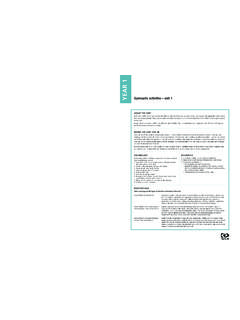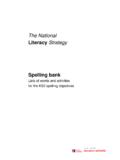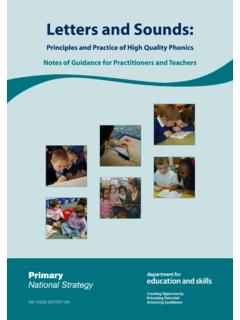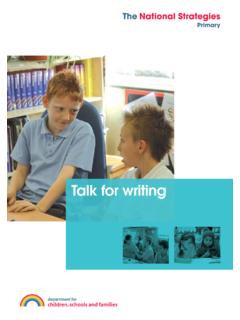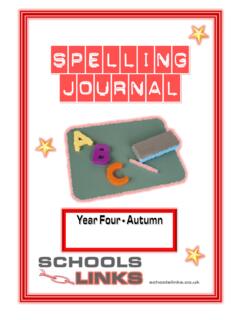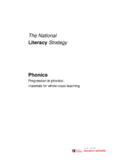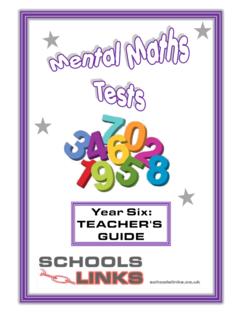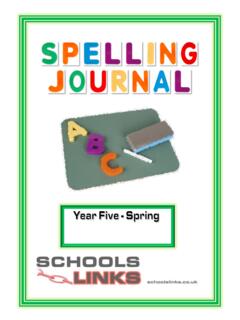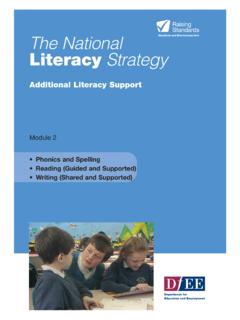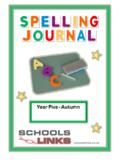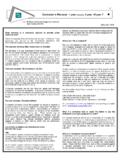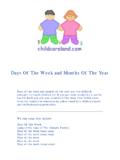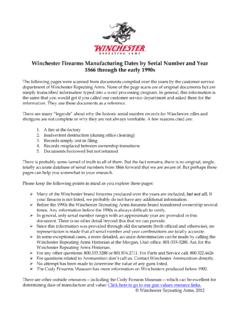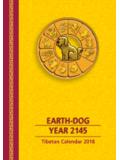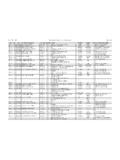Transcription of Year 6 Literacy Booster Lessons Status: …
1 GuidanceCurriculum, Examination andAssessmentYear 6 teachers andteaching assistantsStatus: RecommendedDate of issue: 01/03 Ref: DfES 0052/2003 The National LiteracyStrategyYear 6 Literacy Booster LessonsDfES PublicationsTel: 0845 60 222 60 Fax: 0845 60 333 60 Textphone: 0845 60 555 60E-mail: no: DfES 0052/2003 Crown copyright 2003 Produced by the Department for Education and SkillsExtracts from this document may be reproduced for non-commercial or training purposes on the condition that the source is 01/03[1220] item 4250 cover 10/12/02 2:59 pm Page 4 The National LiteracyStrategyYear 6 Literacy Booster Lessons [1220] item 4250 title page 10/12/02 2:54 pm Page 3iiiContentsIntroduction to the Literacy Booster lessonsvLiteracy Booster lessonsviSpelling challengesviiiLiteracy Booster lesson 1: Looking forward1 Literacy Booster Lessons 2 7: Persuasion2 PCMs 1 39 Literacy Booster Lessons 8 13: Narrative12 PCMs 4 921 Literacy Booster Lessons 14 17: Report28 Literacy Booster lesson 18: Looking back35 PCMs 10 1336vIntroduction to the literacybooster lessonsThe National Literacy and Numeracy Strategies aim to raise standards for all children.
2 The skills,competencies and learning experiences they address are essential to children s success in secondaryeducation and their lives beyond school. Some children may need extra support beyond the literacyhour and the daily mathematics lesson . The Strategies have produced a range of interventionprogrammes for schools to support children so that they can make accelerated progress and,wherever possible, catch up with their Booster Lessons included in this book are designed for those children who need targeted supportto secure National Curriculum level 4 in the Key Stage 2 English tests. They are not intended as arevision programme for all year 6 children.
3 As the children work through the 18 Booster Lessons , theywill revisit key objectives that will help to ensure that they achieve their full potential in the end-of-KeyStage 2 tests. The National Literacy Strategy has produced a range of additional resources to support teachers asthey plan and resource teaching throughout year 6. Further details are available on our website, Many year 6 teachers make use of the NLS planning exemplification outlined below, and the boostermaterials are designed to complement this approach to planning. Teachers who use alternativeapproaches in year 6 will need to review these Booster materials and make adjustments 6 Planning exemplificationThe year 6 planning exemplification and accompanying CD-ROM contain examples of units of workfor teaching children in year 6.
4 The seven units contained in the 2002 03 edition are drawn from allthree terms in year 6. The units cover reading and writing objectives in narrative, poetry and plays, inthree non-fiction text types, and in the related sentence and word level objectives. They exemplifyrich, varied and challenging teaching to support children towards achieving levels 4 and 5 at the endof year 6. The suggested length of these units varies from one week to three. The five-week revisionunit prepares children specifically for the Key Stage 2 test. Key Stage 2 test 2003 The units take full account of the changes made to the writing test and the mark scheme for the KeyStage 2 test in 2003.
5 The writing of both longer and shorter texts has been incorporated into thenarrative and non-narrative units. viLiteracy Booster Lessons The Booster Lessons include an introductory lesson and a concluding lesson . In the introductorylesson, the children are introduced to the programme and to their targets for improvement. In the finallesson, they reflect on what they have learned and identify any further targets. The children areinvolved in self-evaluation throughout the focus of the Lessons is particularly on writing, as this continues to be an area of weakness. In the2002 Key Stage 2 tests, although the percentage of children achieving level 4 and above in writingrose by 3% to 60%, there were still 31% of the cohort who achieved level 3 in writing (compared to13% in reading) and 36% of all boys attained this level.
6 The Booster Lessons cover: persuasive writing (six Lessons ); narrative writing (six Lessons ); report writing (four Lessons ). The sections include guided reading sessions to introduce the text type, review key features andprovide models to support shared and independent writing. The Lessons provide opportunities forchildren to plan, write and edit against agreed criteria. Each writing lesson also includes a shortspelling challenge to consolidate spelling skills. The spelling challenges are intended as quickreminders of spelling work that children have already covered. The National Literacy Strategy SpellingBankprovides detailed exemplification and guidance on the teaching of these objectives.
7 The Lessons are designed to last approximately half an hour. However, if you are planning to deliver the materials during an Easter School, they can be delivered back-to-back in order to fit into one-hour sessions. The Lessons include two teaching sequences: Guided reading Lessons book introduction strategy check independent reading return to the text response to the text Supported Lessons spelling challenge introduction and recap on previous Lessons the new work for the lesson independent work review and preparation for next steps Staffing Schools use a range of staff to support Booster classes, including existing class teachers, teachingassistants and other support staff.
8 It is important that the staff have experience of managing andsupporting groups and are familiar with the children s strengths and weaknesses. Identifying the children and informing parentsSchools use their assessment data to identify the group, who, with additional support, should be ableto achieve level 4. These data will include ongoing assessment and qualitative information about thechildren. It is important that the children targeted for support through the Booster classes are thosewho need this to help them reach level 4. Parents / carers should be contacted before the boosterclasses start and should be kept informed throughout.
9 Many schools find that the support andinvolvement of the parents is important to keep children motivated and to give them opportunities topractise at home what they have for the Booster lessonsThe Lessons are suitable to be used with a group or class of children in Booster classes over anumber of weeks. These classes may take place during the school day or at other times. Someschools deliver Booster Lessons before school at Breakfast Clubs , while some incorporate theclasses into after-school programmes and others have used Saturday mornings. Easter Schools If you are planning to run an Easter School, the Booster Lessons will provide a useful resource.
10 Thesection on narrative has been written so that it will fit particularly well into a four-day Easter Schoolstructure: Day 1 Booster Lessons 1 and 8 Day 2 Booster Lessons 9 and 10 Day 3 Booster Lessons 11 and 12 Day 4 Booster Lessons 13 and 18 Additional materials For information about additional materials see the NLS website: sessions and materials from Further Literacy Support could be added. Schools have all beensent a copy of the teacher s Teacher s book DfES reference number 0584/2002 FLS Resource pack DfES reference number 0359/2002 year 6 Planning Exemplification:Copies of the planning exemplification are freely available for everyYear 6 teacher from your LEA or on line at reference number0752/200 Grammar for Writing:DfES reference number 0107/2000 Spelling Bank:DfES reference number 0086/2001viiIntroduction to the spelling challengesSome teaching strategies All the spelling challenges in the Booster Lessons are revision of spelling work that children will alreadyhave been taught from the NLS Framework.
